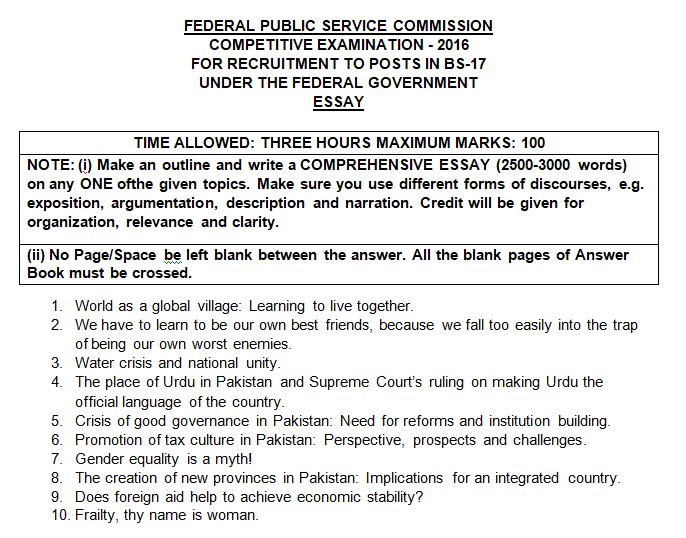CSS Essay Paper 2016
- World as a global village: Learning to live together.
- We have to learn to be our own best friends because we fall too easily into the trap of being our own worst enemies.
- Water crisis and national unity.
- The place of Urdu in Pakistan and the Supreme Court’s ruling on making Urdu the official language of the country.
- Crisis of good governance in Pakistan: Need for reforms and institution building.
- Promotion of tax culture in Pakistan: Perspective, prospects and challenges.
- Gender equality is a myth!
- The creation of new provinces in Pakistan: Implications for an integrated country.
- Does foreign aid help to achieve economic stability?
- Frailty, thy name is a woman.
Summaries of Essays:
Here are simplified summaries of the additional essays:
1. World as a Global Village: Learning to Live Together
This essay explores the concept of the world as a “global village,” where advancements in communication and technology have brought people from different cultures and regions closer. The writer emphasizes the importance of mutual understanding, cooperation, and tolerance in maintaining global peace and harmony. The essay stresses that living together peacefully requires respecting diversity and embracing shared values.
2. We Have to Learn to Be Our Own Best Friends Because We Fall Too Easily into the Trap of Being Our Own Worst Enemies
This essay reflects on how individuals often undermine their success and happiness through self-doubt, negative thinking, and poor decisions. The writer urges people to become their supporters, emphasizing the need to practice self-care, self-compassion, and positive thinking to thrive.
3. Water Crisis and National Unity
This essay discusses how Pakistan’s water crisis threatens not just its environment but also its national unity. The writer argues that water scarcity can fuel regional tensions and socio-economic disparities, making it crucial for the government and people to work together to address the crisis through conservation, better management, and equitable distribution of water resources.
4. The Place of Urdu in Pakistan and the Supreme Court’s Ruling on Making Urdu the Official Language of the Country
This essay examines the role of Urdu as the national language of Pakistan and the importance of the Supreme Court’s ruling to make it the official language of government institutions. The writer discusses the significance of preserving Urdu as a cultural and linguistic identity, while also considering the practical challenges of implementing such a decision in a multilingual country.
5. Crisis of Good Governance in Pakistan: Need for Reforms and Institution Building
This essay addresses the issue of poor governance in Pakistan, which hampers progress and development. The writer argues that the country needs to undertake comprehensive reforms, including strengthening institutions, ensuring transparency, and promoting accountability, to improve governance and create a more effective state.
6. Promotion of Tax Culture in Pakistan: Perspective, Prospects, and Challenges
This essay discusses the importance of developing a strong tax culture in Pakistan. The writer highlights the challenges, such as low tax compliance, lack of awareness, and corruption, and stresses the need for education and policy reforms to improve tax collection. The essay argues that a robust tax system is essential for funding government programs and ensuring national development.
7. Gender Equality is a Myth!
This essay critiques the idea of complete gender equality, claiming that societal structures and cultural norms still perpetuate discrimination against women. The writer argues that while there have been advances in women’s rights, deep-seated barriers prevent true equality, particularly in areas like education, employment, and decision-making.
8. The Creation of New Provinces in Pakistan: Implications for an Integrated Country
This essay explores the debate over creating new provinces in Pakistan, considering the potential benefits and drawbacks. The writer argues that while new provinces could help address regional disparities and improve governance, they could also create further divisions and complicate national unity. The essay stresses the importance of carefully considering the implications for national integration and harmony.
9. Does Foreign Aid Help to Achieve Economic Stability?
This essay critically examines the role of foreign aid in achieving economic stability in developing countries. The writer argues that while foreign aid can provide temporary relief, it often fails to address the root causes of poverty and economic instability. The essay suggests that sustainable development requires structural reforms and better management of domestic resources rather than relying solely on external assistance.
10. Frailty, Thy Name is a Woman
This essay challenges the stereotype that women are fragile, a view often perpetuated by societal norms. The writer argues that this perception of women as inherently weaker is outdated and unjust and that women have proven their strength in various fields. The essay calls for empowering women and recognizing their contributions to society.
